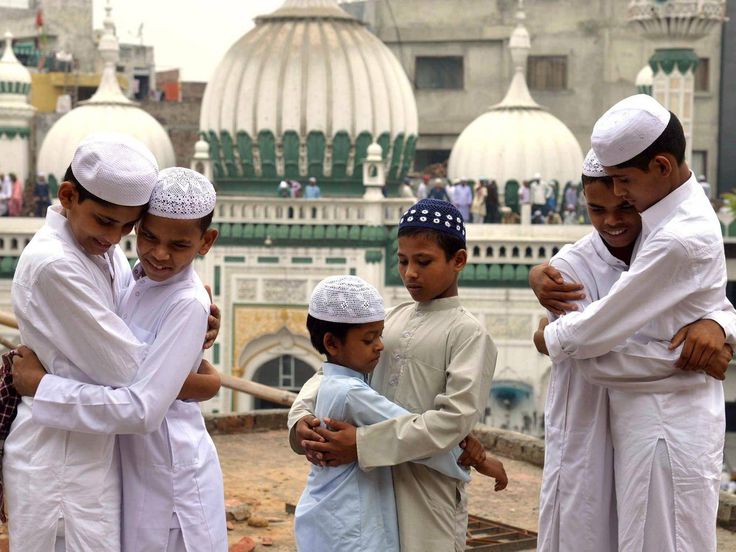Eid is more than just a day – it’s a global celebration of joy, faith, and feasting! While the essence remains the same everywhere, each country adds its own special twist to the festivities. From extravagant feasts to heartwarming traditions, Eid is celebrated in unique and unforgettable ways around the world. So, buckle up and get ready for a whirlwind tour of how different cultures turn this joyous occasion into an unforgettable celebration!
Middle East

In Middle Eastern countries like Kingdom of Saudi Arabia and the UAE – Eid is a grand celebration, with the entire country observing it with enthusiasm. Families gather for prayers in the morning, followed by feasts and exchanging gifts, especially giving Eidiya (money) to the children. The streets are decorated, and people often wear new clothes for the occasion. Traditional dishes like kabsa, machboos, baklava, and kunafa are prepared.
South Asia

In India and Pakistan, the festive season is a family-centric celebration, with morning prayers in mosques followed by a big family gathering. The aroma of biryani and sheer khurma fills the air. In Pakistan there’s a large focus on charity, with many giving to the poor and needy. In India, after Eid prayers, people often go for Eid milans (social gatherings), visit relatives, and enjoy delicious food.
Like other South Asian countries, Eid in Bangladesh is a time for family reunions, delicious food, and giving gifts. The day starts with a communal prayer, followed by a day of feasting on pulao and korma. New clothes and visiting loved ones are key parts of the celebration.
Southeast Asia

In Indonesia Eid is known as Lebaran, the most important holiday of the year. After fasting for Ramadan, families travel long distances to reunite with relatives in what is called mudik. It’s a holiday full of visiting, feasting on ketupat (rice cakes) with rendang (beef stew), and exchanging gifts. People also wear traditional clothes, including kebaya and sarongs, and there are special prayers in mosques.
Whereas in Malaysia it is known as Hari Raya Puasa. It starts with a visit to the mosque for prayers, followed by family reunions and visits to neighbors. People often wear baju kurung or baju melayu and enjoy traditional foods like satay, lemang (rice cooked in bamboo), and kuih-muih (sweet cakes).
Turkey

Eid in Turkey is called Ramazan Bayramı or Şeker Bayramı (Sugar Festival). The day begins with prayers at the mosque, and families gather for big feasts. Traditional sweets like baklava, lokum (Turkish delight), and sherbet are widely enjoyed. Visiting relatives, especially elders, and exchanging gifts is an important part of the holiday. Many people also engage in acts of charity during this time.
Africa

In Egypt, Eid begins with special prayers at mosques and is followed by a big family meal. Traditional sweets like kahk (shortbread cookies filled with nuts or dates) are prepared and shared with friends and neighbors. People also visit the graves of loved ones and offer prayers for them. Eid in Egypt is also marked by giving charity to the less fortunate.
Whereas in Morocco the day starts with morning prayers and a family breakfast of harira (a hearty soup). Meskouta (Moroccan cake) and baklava are common desserts. People wear traditional djellaba or kaftan, and it’s a time for visiting family, sharing meals, and gifting Eidiya (money). Charity plays a central role in the celebration as well.
Western Countries

In United States and United Kingdom Eid is often celebrated with community prayers in mosques, followed by family gatherings and feasts. People wear their finest clothes, often new, and exchange gifts and Eidiya. The holiday is an opportunity to showcase diverse Muslim cultures, and many Muslims invite non-Muslim friends and neighbors to join in the celebrations. Food is a major part of the festivities, with dishes from various Muslim cultures being served. It’s also a time to engage in charity and community service.
Sub-Saharan Africa

In Nigeria, Eid is marked by large communal prayers and visits to relatives. The festivities often last for several days, with families hosting guests and serving meals like jollof rice, pounded yam, and suya (spicy grilled meat). Muslims often wear their best traditional clothes and take part in giving Zakat al-Fitr (charity).
Australia

While it’s not a public holiday in Australia, the Muslim community still celebrates Eid with festive prayers at mosques and gatherings with family and friends. Many communities host Eid festivals, and the day is often spent visiting relatives, feasting, and enjoying traditional dishes like lamb roast, baklava, and sweets.
Whether it’s special Eid prayers, gatherings, Eidiya for children, or helping those in need, the spirit of Eid is about community, gratitude, and generosity.
(Contributed by Wajeeha Syed)











